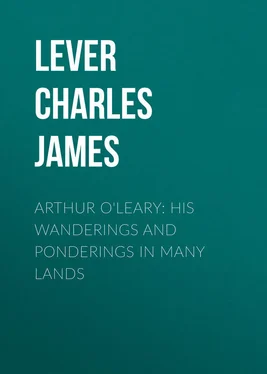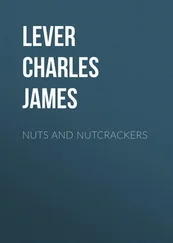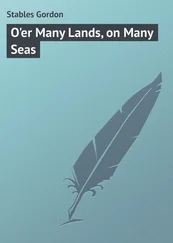Charles Lever - Arthur O'Leary - His Wanderings And Ponderings In Many Lands
Здесь есть возможность читать онлайн «Charles Lever - Arthur O'Leary - His Wanderings And Ponderings In Many Lands» — ознакомительный отрывок электронной книги совершенно бесплатно, а после прочтения отрывка купить полную версию. В некоторых случаях можно слушать аудио, скачать через торрент в формате fb2 и присутствует краткое содержание. Издательство: Иностранный паблик, Жанр: literature_19, foreign_antique, foreign_prose, на английском языке. Описание произведения, (предисловие) а так же отзывы посетителей доступны на портале библиотеки ЛибКат.
- Название:Arthur O'Leary: His Wanderings And Ponderings In Many Lands
- Автор:
- Издательство:Иностранный паблик
- Жанр:
- Год:неизвестен
- ISBN:нет данных
- Рейтинг книги:3 / 5. Голосов: 1
-
Избранное:Добавить в избранное
- Отзывы:
-
Ваша оценка:
- 60
- 1
- 2
- 3
- 4
- 5
Arthur O'Leary: His Wanderings And Ponderings In Many Lands: краткое содержание, описание и аннотация
Предлагаем к чтению аннотацию, описание, краткое содержание или предисловие (зависит от того, что написал сам автор книги «Arthur O'Leary: His Wanderings And Ponderings In Many Lands»). Если вы не нашли необходимую информацию о книге — напишите в комментариях, мы постараемся отыскать её.
Arthur O'Leary: His Wanderings And Ponderings In Many Lands — читать онлайн ознакомительный отрывок
Ниже представлен текст книги, разбитый по страницам. Система сохранения места последней прочитанной страницы, позволяет с удобством читать онлайн бесплатно книгу «Arthur O'Leary: His Wanderings And Ponderings In Many Lands», без необходимости каждый раз заново искать на чём Вы остановились. Поставьте закладку, и сможете в любой момент перейти на страницу, на которой закончили чтение.
Интервал:
Закладка:
“The peril of this proceeding grew with every moment; sometimes our frail boat would be struck with such force as threatened to stave in every plank; sometimes was she driven high upon a piece of ice, which took all our efforts to extricate her from, while, as we advanced, no passage presented itself before us, but flake upon flake of frozen matter, among which were fragments of wrecks, and branches of trees, mixed up together. The sailors, who had undertaken the enterprise against their will, now resolved they would venture no further, but make their way back to the ship while it was yet possible. I alone opposed this plan – to return, without at least having reached the shore, I told them, would be a disgrace, the safety of all on board was in a manner committed to our efforts; and I endeavoured by every argument to induce them to proceed. To no purpose did I tell them this; of no use was it that I pointed out the lights on shore, which we could now see moving from place to place, as though we had been perceived, and that some preparations were making for our rescue. I was outvoted, however: back they would go; and one of them as he pushed the boat’s head round, jeeringly said to me —
“‘Why, with such jolly good foot-way, don’t you go yourself? you’ll have all the honour, you know.’
“The taunt stung me to the quick, the more as it called forth a laugh from the rest. I made no answer, but seizing a boat-hook, sprang over the side upon a large mass of ice. The action drove the boat from me. I heard them call to me to come back; but come what would, my mind was made up. I never turned my head, but with my eyes fixed on the shore-lights, I dashed on, glad to find that with every stroke of the sea the ice was borne onwards towards the land. At length the sound of the breakers ahead, made me fearful of venturing farther; for as the darkness fell, I had to trust entirely to my hearing as my guide. I stood then rooted to the spot, and as the wind whistled past, and the snow-drift was borne in eddying currents by me, I drove my boat-hook into the ice, and held on firmly by it. Suddenly, through the gloom a bright flash flared out, and then I could see it flitting along, and at last, I thought I could mark it, directing its course towards the ship; I strained my eyes to their utmost, and in an ecstasy of joy I shouted aloud, as I beheld a canoe manned by Indians, with a pine torch blazing in the prow. The red light of the burning wood lit up their wild figures as they came along – now carrying their light bark over the fields of ice; now launching it into the boiling surf, and thus, alternately walking, and sailing, they came at a speed almost inconceivable. They soon heard my shouts, and directed their course to where I stood; but the excitement of my danger, the dreadful alternations of hope and fear thus suddenly ceasing, so stunned me that I could not speak, as they took me in their arms and placed me in the bottom of the canoe. Of our course back to shore I remember little: the intense cold, added to the stupefaction of my mind, brought on a state resembling sleep; and even when they lifted me on land, the drowsy lethargy clung to me; and only when I found myself beside the blaze of a wood-fire, did my faculties begin to revive, and, like a seal under the rays of the sun, did I warm into life, once more. The first thing I did, when morning broke, was to spring from my resting-place beside the fire, and rush out, to look for the ship. The sun was shining brilliantly – the bay lay calm as a mirror before me, reflecting the tall mountains and the taper pines: but the ship was gone, not a sail appeared in sight; and I now learned, that when the tide began to make, and she was enabled to float, a land breeze sprung up which carried her gently out to sea, and that she was in all likelihood, by that time, some thirty miles in her course up the St. Lawrence. For a moment, my joy at the deliverance of my companions was unchecked by any thought of my own desolate condition; the next minute, I remembered myself, and sat down upon a stone, and gazed out upon the wide waters with a sad and sinking heart.”
CHAPTER VIII. MR. O’KELLY’S TALE. – CONCLUDED
“Life had presented too many vicissitudes before me, to make much difference in my temperament, whatever came uppermost. Like the gambler, who if he lose to-day, goes off consoling himself, that he may be a winner to-morrow, I had learned never to feel very acutely any misfortune, provided only that I could see some prospect of its not being permanent: – and how many are there who go through the world in this fashion, getting the credit all the while of being such true philosophers, so much elevated above the chances and changes of fortune, and who, after all, only apply to the game of life the same rule of action they practise at the ‘ rouge et noir ’ table.
“The worthy folks among whom my lot was now cast, were a tribe of red men, called the Gaspé Indians, who, among other pastimes peculiar to themselves, followed the respectable and ancient trade, of wreckers, in which occupation the months of October and November usually supplied them with as much as they could do – after that, the ice closed in, on the bay and no vessel could pass up or down the St. Lawrence, before the following spring.
“It was for some time to me a puzzle, how people so completely barbarous as they were, possessed such comfortable and well-appointed dwellings, for not only had they log-huts well jointed, and carefully put together, but many of the comforts of civilized life were to be seen in the internal decorations. The reason I at length learned, from the chief, in whose house I dwelt, and with whom I had already succeeded in establishing a sworn friendship. About fifteen years previous, this bay was selected by a party of emigrants, as the locale of a settlement. They had been wrecked on the island of Anticosti themselves, and made their escape to Gaspé, with such remnants of their effects as they could rescue from the wreck. There, they built houses for themselves, made clearings in the forest, and established a little colony, with rules and regulations for its government. Happily for them, they possessed within their number almost every description of artificer requisite for such an undertaking, their original intention being to found a settlement in Canada, and thus carpenters, shoe-makers, weavers, tailors, mill-wrights, being all ready to contribute their aid and assistance to each other, the colony made rapid progress, and soon assumed the appearance of a thriving and prosperous place. The forest abounded in wild deer and bears, the bay not less rich in fish, while the ground, which they sowed with potatoes and Indian-corn, yielded most successful crops, and as the creek was never visited by sickness, nothing could surpass the success that waited on their labours.
“Thus they lived, till in the fall of the year, a detachment of the Gaspé Indians, who came down every autumn for the herring-fishery, discovered that their territory was occupied, and that an invading force were in possession of their hunting-grounds. The result could not be doubted; the red men returned home to their friends with the news, and speedily came back again with reinforcements of the whole tribe, and made an attack on the settlement. The colonists, though not prepared, soon assembled, and being better armed, for their fire-arms and cutlasses had all been saved, repelled the assailants, and having killed and wounded several of them, drove them back into the forest. The victory, however complete, was the first day of their misfortunes; from that hour they were never safe; sometimes a marauding party of red men would dash into the village at nightfall, and carry away some of the children before their cries could warn their parents. Instead of venturing as before into the ‘bush’ whenever they pleased, and in small numbers, they were now obliged to go with the greatest circumspection and caution, stationing scouts here and there, and, above all, leaving a strong garrison to protect the settlement against attack in their absence. Fear and distrust prevailed everywhere, and instead of the peace and prosperity that attended the first year of their labours, the land now remained but half tilled; the hunting yielded scarcely any benefit; and all their efforts were directed to their safety, and their time consumed in erecting outworks and forts to protect the village.
Читать дальшеИнтервал:
Закладка:
Похожие книги на «Arthur O'Leary: His Wanderings And Ponderings In Many Lands»
Представляем Вашему вниманию похожие книги на «Arthur O'Leary: His Wanderings And Ponderings In Many Lands» списком для выбора. Мы отобрали схожую по названию и смыслу литературу в надежде предоставить читателям больше вариантов отыскать новые, интересные, ещё непрочитанные произведения.
Обсуждение, отзывы о книге «Arthur O'Leary: His Wanderings And Ponderings In Many Lands» и просто собственные мнения читателей. Оставьте ваши комментарии, напишите, что Вы думаете о произведении, его смысле или главных героях. Укажите что конкретно понравилось, а что нет, и почему Вы так считаете.












